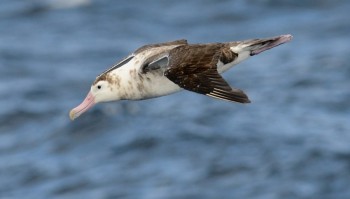Gohar Petrossian (Department of Criminal Justice, City University of New York) and colleagues have published in the journal Oryx on the relationship between illegal longline fishing and the threatened status of the World’s albatrosses. The paper's abstract follows.
“Birds are commonly entangled in long-line fisheries, and increases in long-line fishing activity have consistently caused declines in seabird populations. Environmental criminology would posit that the risk of such declines is greater in the case of illegal long-line fisheries, which are less likely to implement bycatch mitigation measures. To investigate this possibility we examined the overlap between data on illegal fishing and albatross at-sea occurrence ranges. Moderate correlations were found between mean exposure to illegal fishing and the Red List status of albatross species, but none were found between Red List status and total fishing pressure. A second analysis overlaid albatross at-sea occurrence ranges with long-lining data for the member countries of the Convention on Conservation of Southern Bluefin Tuna to compare the effect of exposure to legal and illegal hooks on Red List status. Lacking a better measure, Country A's hooks were used as a proxy for illegal hooks. Critically Endangered and Endangered species were 12 and 3.4 times more exposed to illegal hooks, respectively, than Near Threatened species, whereas there was no relationship between Red List status and exposure to legal hooks. Country-level analyses confirmed these findings, which provide evidence that illegal long-line fishing poses a particular threat to the survival of albatrosses. The findings suggest that the bird conservation lobby should work closely with fisheries authorities to tackle illegal fishing, and that research should identify the highest risk areas of overlap between illegal fishing and albatross at-sea ranges.”

Critically Endangered Amsterdam Albatross at sea, photograph by Kirk Zufelt
Reference:
Petrossian, G.A., de By, R.A. & Clarke, R.V. 2016. Illegal long-line fishing and albatross extinction risk. Oryx doi.org/10.1017/S0030605316000818.
John Cooper, ACAP Information Officer, 25 November 2016

 English
English  Français
Français  Español
Español